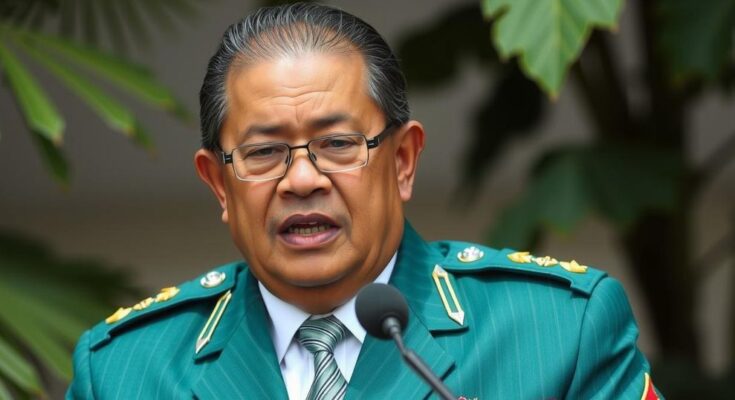Papua New Guinea’s Prime Minister James Marape announced the country’s intention to return to UN climate summits after boycotting this year’s talks due to a lack of focus on forest conservation. Marape emphasized that discussions on climate change must prioritize resource management and ecological sustainability. Papua New Guinea aims to participate actively in future conferences and will support Australia’s bid for COP31 if conservation priorities are recognized.
Prime Minister James Marape of Papua New Guinea announced his country’s commitment to participate in future UN climate conferences, following a boycott of this year’s summit in Azerbaijan. The Prime Minister emphasized a need for a stronger focus on forest conservation as part of climate discussions. He articulated that Papua New Guinea would attend the COP30 summit in Brazil next year and intends to advocate for accountability from nations with large carbon emissions. Marape underscored that discussions on climate change must incorporate resource management and the vital role of forestry in mitigating carbon footprints. Additionally, Papua New Guinea will support a joint Australian bid to co-host COP31 in 2026, provided that forest conservation remains a priority in the dialogue. Marape had stated that the lack of respect for forest stakeholders prompted the boycott of the previous summit, underscoring the country’s unique ecological significance as it is home to a substantial portion of the world’s rainforests, often referred to as the “lungs of the Earth.”
The article discusses Papua New Guinea’s stance on climate change and the importance of forest conservation in the context of global climate talks. The country, rich in rainforest resources, has expressed frustration with the UN climate summits, particularly when they do not address the interests of forest-dependent communities. By prioritizing forest management in discussions, Papua New Guinea aims to ensure that its ecological contributions are acknowledged in international climate policy. The Prime Minister’s commitment to attend future summits signals a desire for engagement and influence in an arena where Pacific Island nations face significant climate vulnerabilities.
In summary, Prime Minister James Marape’s affirmation to engage in future UN climate talks underscores Papua New Guinea’s focus on the critical issue of forest conservation. His remarks highlight a call for accountability from major carbon emitters in addressing climate change while maintaining the role of forestry as pivotal in climate discussions. Supporting Australia’s bid for COP31 also reflects an intent to shape climate dialogue in favor of sustainable practices. Therefore, the nation’s participation in these conferences is vital to advocate for the preservation of its natural resources and the wellbeing of its environment.
Original Source: www.france24.com




